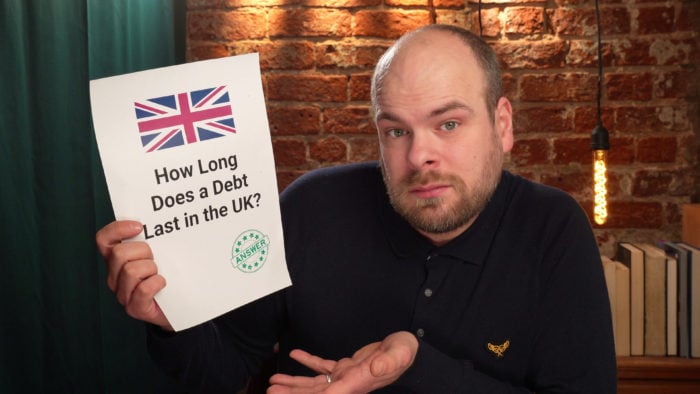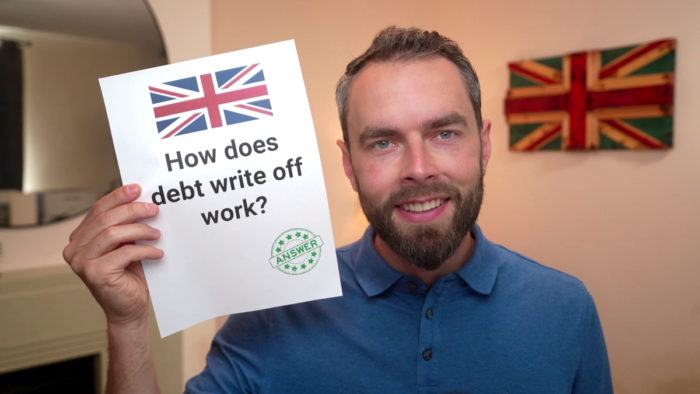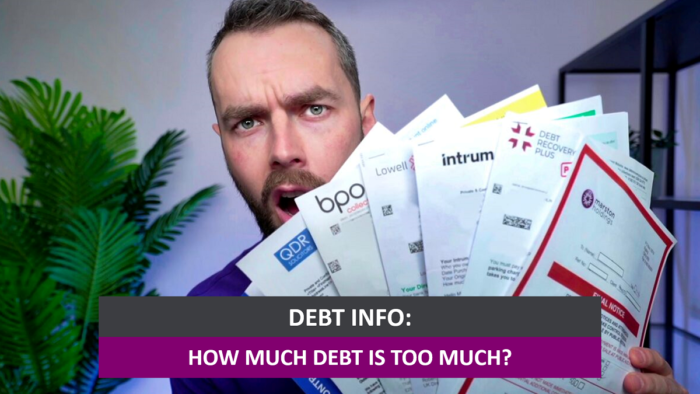How to Write Off Debt Legally – 5 Options Explored
For free & impartial money advice you can visit MoneyHelper. We work with The Debt Advice Service who provide information about your options. This isn’t a full fact-find, some debt solutions may not be suitable in all circumstances, ongoing fees might apply & your credit rating may be affected.

For free & impartial money advice you can visit MoneyHelper. We work with The Debt Advice Service who provide information about your options. This isn’t a full fact-find, some debt solutions may not be suitable in all circumstances, ongoing fees might apply & your credit rating may be affected.
Are you feeling stressed about paying your debt? This can be a big worry, but you’re in the right place for answers. Each month, over 170,000 people come to us for advice on sorting out their debts. In this article, we’ll give you clear and easy-to-understand guidance on:
- What it means to write off debt.
- If it’s possible to write off your debt.
- Five legal ways to write off debt in the UK.
- How each option might affect your life.
- Who can help you with your debt.
We know dealing with debt can be hard. We’re here to help you understand your choices. With our advice, you can find a way forward that fits you best.
Citizens Advice stresses the need for professional debt advice, noting that 60% of adults in financial trouble hesitate to seek help.1 Don’t become a part of this statistic!
Whether it’s a small debt or a big one, we’ll go through your options. We’ll also talk about when and how your debt could be written off. It’s important to get the right help for your situation and we’re here to support you every step of the way.
Let’s get started.
Here’s what to do!
There are several debt solutions in the UK, choosing the right one for you could write off some of your unaffordable debt, but the wrong one may be expensive and drawn out.
What Is debt write off?
How a debt solution could help
Some debt solutions can:
- Stop nasty calls from creditors
- Freeze interest and charges
- Reduce your monthly payments
A few debt solutions can even result in writing off some of your debt.
Here’s an example:
Situation
| Monthly income | £2,504 |
| Monthly expenses | £2,345 |
| Total debt | £32,049 |
Monthly debt repayments
| Before | £587 |
| After | £158 |
£429 reduction in monthly payments
If you want to learn what debt solutions are available to you, click the button below to get started.
Is It Possible to Write Off my Debt?
| Debt Solution | Description | Formality | Debt Type | Debt Range | Legally Binding | Impact on Credit Score | Asset Risk | Monthly Payment | Duration | Creditor Agreement Required |
|---|---|---|---|---|---|---|---|---|---|---|
| Debt Management Plan (DMP) | Agreement to pay back non-priority debts in one monthly payment. | Informal | Non-priority debts | Any amount |
No | Yes | No | Varies | Varies (until debt is paid) | No (but creditors must be informed) |
| Individual Voluntary Arrangement (IVA) | Agreement to pay back all or part of your debts over a set period. | Formal | All or part of debts | Usually over £10,000 | Yes | Yes | Possible | Fixed | Fixed period, usually 5-6 years | Yes (75% by debt value must agree) |
| Debt Relief Order (DRO) | Freezes debt for a year and be potentially written off. | Formal | Non-priority debts | <£20,000 debt | Yes | Yes | No | None during freeze | 12 months | No (court approval needed) |
| Bankruptcy | Legal status for those who cannot repay debts, potentially writes off debts. | Formal | Unmanageable debts | Any amount, typically high debt | Yes | Yes | High | None during bankruptcy | Usually 12 months, then discharge | No (court process) |
| Consolidation Loan | Taking out a new loan to pay off all existing debts. | – | Multiple debts | Based on loan amount | Varies | Yes | Depends on loan type | Fixed | Depends on loan terms | No |
| Payment Holiday | Temporary relief or reduced payments offered by creditors. | – |
short-term financial difficulties | Any | No | Yes | Low | Reduced or paused payments | Break of up to 6 or 12 months, depending on circumstances, payment history, and creditor’s policy. | No |
| Informal Negotiation | Direct negotiation with creditors for reduced payments or extended terms. | – | All debts | Any | No | Possible | No | Negotiable | Until agreement terms are met | No |
| Statutory Debt Repayment Plan (SDRP) | Plan to repay debts over a reasonable time, with protections from creditor action. | Formal | All debts | Varies | Yes | Yes | No | Fixed | Varies, based on ability to pay | Yes |
| Equity Release | Homeowners release equity from their home to pay off debts. | – |
Debts of homeowners, typically older individuals aged 55+ | Varies and depends on property value | Yes | Yes | Asset (home) is used as collateral | Varies | 8-10 weeks timeframe from application to fund disbursement. Lifetime; repaid on house sale/death. | No |
Can All Arrears Be Written Off?
» TAKE ACTION NOW: Fill out the short debt form
How You Can Write Off Debt Legally
Before considering these options, you could try writing to your creditor to ask for your debt to be written off using our free letter template.
Creditors are under no obligation to write off your debt so if denied, you should then consider one of the following options:
A debt settlement offer is an offer made to your creditor asking for them to clear the debt with the amount offered. This often means offering less than you owe and having the rest of the debt you owe wiped.
For example, you might have a debt of £1,000 and make a debt settlement offer of £750. If they accept, you pay the £750 and manage to wipe the other £250. But keep in mind that some creditors are not at all open to debt settlement negotiation. If they are, not every creditor will accept 75% of your debt and it all depends on your situation.
- Individual Voluntary Arrangements
Another way to write off part of your debt, but not all of it, is with a debt solution called an Individual Voluntary Arrangement (IVA).
You may qualify for an IVA if you:
- Have multiple debts
- Have combined debts over £12,000
- Can repay at least £100 each month (usually £200+ meaning you need to be employed)
The IVA is a legal agreement between you and your creditors organised by a certified insolvency practitioner.
You must make monthly repayments for a fixed term, typically 60 months. At the end of this term, any debt you have not repaid is automatically wiped.
This could mean that up to 85% of your debt is wiped!
Another debt solution that can write off your debt (this time all of it!) is a Debt Relief Order (DRO). This is a debt solution for people who do not own a home, have less than £75 disposable income each month and have debts below £30,000. It is really for people who really can’t pay off their debts because they have low incomes.
The DRO will block creditors from trying to collect the debt for a full year. Once this year is up, all your debt can be wiped as long as your financial situation has not improved.
You can apply for a DRO from the government. And you can learn more about Debt Relief Orders in our friendly DRO guide!
The other way to wipe of debt is through a legal loophole known as Statute Barred. In a nutshell, it is when debt is too old to be taken to the courts, and therefore, your creditors can never legally force you to pay.
In reality, your debts are not exactly wiped, but they may as well be wiped because you cannot be made to pay and you will never have to deal with bailiffs.
For your debt to qualify for Statute Barred, it must be at least six years old. On top of this, it must not:
- Have been repaid in part over the last six years
- Have been issued with a CCJ
- Have been acknowledged in writing by the debtor over the last six years
If you pay some of the debt off or acknowledge the debt in writing, the clock resets and you would have to wait another six years before it qualifies.
You can find out if your debt qualifies and can be ‘written off’ with the Statute Barred loophole by speaking with debt charities for financial advice. If it does qualify, they can provide you with a letter to send to your creditors to inform them that they cannot collect the debt – and to leave you in peace.
Thousands have already tackled their debt
Every day our partners, The Debt Advice Service, help people find out whether they can lower their repayments and finally tackle or write off some of their debt.

Natasha
I’d recommend this firm to anyone struggling with debt – my mind has been put to rest, all is getting sorted.
Reviews shown are for The Debt Advice Service.
What About Bankruptcy?
Bankruptcy is the fifth option to wiping all of your debt, but it is undoubtedly the most serious of them all. Declaring yourself bankrupt is a serious decision and will have major implications for your long-term finances. It will create restrictions over the rest of your life.
However, bankruptcy is also a very smart and suitable option for people with debt they simply cannot escape from. Declaring yourself bankrupt is not always a bad idea and it could make your debt situation better.
If you do declare yourself bankrupt, it takes around one year for all your debt to be wiped. Don’t rush this decision and start by learning more about bankruptcy and the process involved.
How Will an IVA Affect My Life?
If you do opt for an IVA, it is important to know how this is likely to affect your life in the future outside of your debt. Your insolvency practitioner – the person who organises your IVA – will be able to walk you through everything you need to know but here is a quick guide.
Any income that you may get in the future will be impacted by your IVA. ‘Future income’ can include any profits that you get from selling your home, winning the lottery or a large bonus from your employer.
In my experience, most IVAs will have a windfall clause that requires that this money gets paid towards your debt. Failure to do so is likely to be a breach of the agreement between you and your creditors. Don’t worry! Your insolvency practitioner will go through the details of what falls under the windfall clause.
Some IVAs will require you to sell your assets to pay off your debts. ‘Assets’ in this case include things like your house if it is mortgaged or you own it, any land that is in your name, or even your car. Any assets that you want to keep are excluded from the IVA.
Keep in mind that most of your belongings will not be affected by your IVA. You may be encouraged to sell off more expensive items to pay your debts, but it is very unlikely that anything you use in your home will become part of your IVA.
How Will A Debt Relief Order Affect Me?
Aside from writing off some debt, a debt relief order can have an impact on other parts of your life.
Anything that you have bought on hire purchase, for example, will usually need to be returned. You may also find that your bank account is closed and you will need to open a new one.
Any powers of attorney that you may have for someone’s finances will stop. If anyone has a power of attorney over your finances, this will also end.
You will also have some restrictions during the period of your DRO. This often means that you are unable to borrow more than £500 without informing the creditor about your DRO.
As part of these restrictions, your information will be available on the Insolvency Service’s Individual Insolvency Register. If you believe that having your details on this website could lead to violence against you or your loved ones, you can apply for a court order that your address is not included on the register.
Keep in mind that a debt relief order will remain on your credit report for six years. You will probably find that it is more difficult for you to find a new home while it is there.
Who Can Help?
As there are so many different debt solutions available, it is always a good idea to talk your options through with a professional. Just be mindful about who you choose to advise you!
A financial advisor, for example, will be able to go through your finances in detail and come up with a debt management or repayment plan. However, you need to be aware of any fees that your chosen advisor will charge. Be realistic about who you can afford!
From my experience, you are probably better off avoiding debt relief agencies. These companies often charge expensive fees and do not always offer the best financial advice. You may even find that your creditors will not deal with your chosen debt relief agency at all!
There are several debt relief charities that can help you find the debt solution that will work for you. These services will often be free or very affordable.
- The Debt Advice Foundation offers free IVA help
- Step Change offers free and balanced debt advice to help you find which debt relief option will work best for you
- Citizens Advice offers free debt advice
You Might Not Have to Wipe Your Debts!
If you are in debt and want to wipe it because you can’t afford to pay it back, there could be better solutions available. Some debt solutions allow you to make gradual repayments that are affordable to you.
By not wiping your debts you will safeguard your credit score and future plans for mortgages and other credit.




